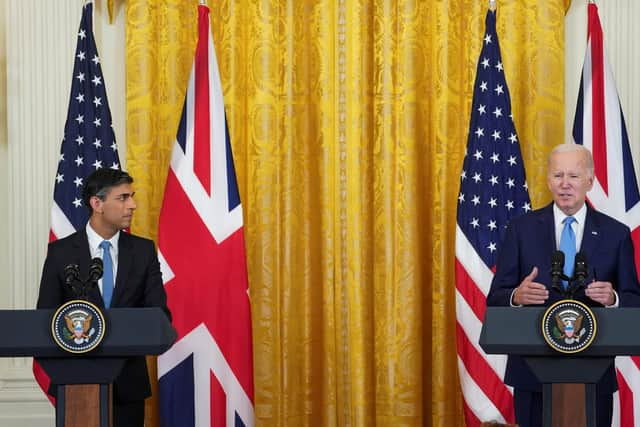The Government lacks a clear plan on tackling inflation crippling household budgets - Andy Brown
That doesn’t mean that average prices will actually fall. It just means that we will have to pay even more but the pain will get worse more slowly.
That makes one of our other major problems especially important. If prices are going up then most people can only keep pace with the change if their wages are increasing at the same rate or better. They aren’t. Or at least on average they aren’t. The gap between price inflation and wage inflation is still over 2 per cent and has been as bad as 5 per cent as recently as last October. There has been no real term improvement in wages in the UK for well over a decade. Which means that people who work for a living have gone through the longest period of lowering living standards in living memory.
Advertisement
Hide AdAdvertisement
Hide AdEven in the dreadful economic times of the 1970s real wages went up by 2.9 per cent a year. That increase had dropped to 1.2 per cent in the early 2000s. Now it has turned negative.


So it is slightly strange that one of the government’s two main strategies for dealing with inflation is to try and hold down wages. The economic facts would seem to demonstrate that wages are not driving inflation but failing to keep up with it. For a lot of people declining real wages are their major personal problem and represent a lot of pain rather than any hope of improvement.
The other attempt of those in charge to cure the problem is proving every bit as painful. The cost of borrowing money is being rapidly raised on the bizarre theory that the best way of stopping inflation is to put one of the most important prices up. The price of money.
Hefty interest rate rises are hitting young home owners really hard. If someone has borrowed £120,000 then every one per cent rise in the price on money hits them with a £100 extra bill every month. Since mortgage rates have risen between 2 per cent and 3 per cent for many and that debt level is very typical for young people in Yorkshire the pain for many is £250 a month already with worse expected.
Advertisement
Hide AdAdvertisement
Hide AdHow many people just starting out in life can afford that kind of hit to their standard of living? Working longer hours is rarely an easy solution for someone who has a young family. So they will have to cut down on their spending and for many that means real worries about how they can afford essentials like baby milk.
Astonishingly this is exactly what the clumsy tool of raising interest rates is designed to do. The main way it cuts inflation is by forcing people and businesses to reduce their spending in order to slow the economy sufficiently to stop prices rising.
Such a strategy brings a lot of collateral damage in its wake. It isn’t just those paying mortgages who suffer. When spending falls, sales for businesses of all sizes drop off and a proportion of those businesses go to the wall.
We seem to have gone right back to the days of austerity with many of the same people being expected to take the pain whilst the usual suspects avoid participating in the collective effort.
Advertisement
Hide AdAdvertisement
Hide AdWhen the price of oil and gas was rising rapidly our energy bills shot through the roof. Then we discovered that the profits of the suppliers had increased to record levels as they chose to add to the problem by raising prices by more than their costs. Stoking inflation. Now that wholesale prices have fallen back to their old levels our bills have been very slow to do the same.
Instead of trying to tackle inflation by trying to control this cynical excessive profiteering effectively the government has just announced that if wholesale prices of fuel and gas stay low they will abolish all the windfall taxes they announced. That seems a strange way to exercise strong control over price rises.
Very similar attempts to increase margins at the expense of customers are now underway in the banking sector. Which are also directly contributing to inflation. Anyone saving money will have seen some increase in the rate of interest they get. What they won’t have seen is rises in rates that equal those for borrowers. Many of the biggest banks are now busy declaring their own hefty increases in profits and the government’s approach seems to be to ask them nicely for restraint. Those banks are generating extra revenue at the expense of extra pain for home buyers.
In the States billions of dollars are being spent on an Inflation Reduction Act that involves a lot of government investment to help trigger projects which will eventually cut costs and prices. There is much less sign of the British government having a clear plan.
Andy Brown is the North Yorkshire Councillor for Aire Valley.